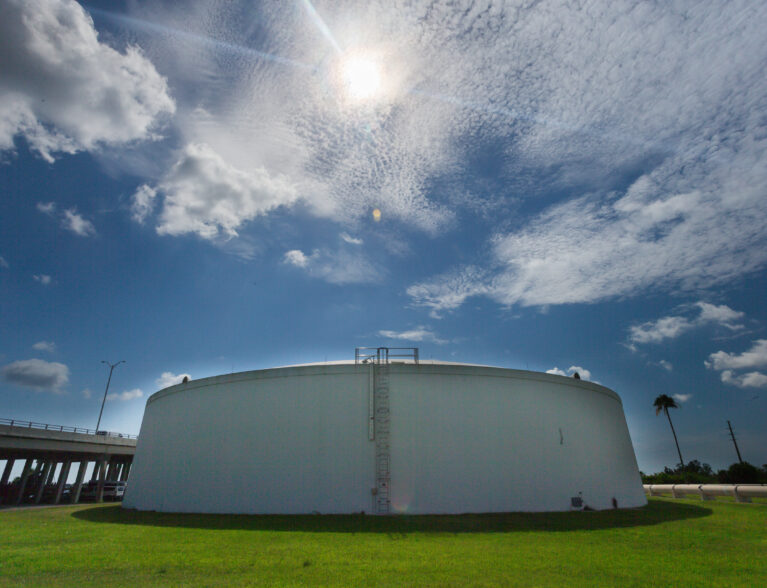
Bid documents for the bonds needed to finance a state-of-the-art Vero Beach wastewater treatment facility at the airport reveal another major hike in the cost of the plant to be borne by ratepayers inside and outside the city limits.
The planned facility – which Vero has called a Water Reclamation Plant and even a “One Water Campus” because it will process not only residential and commercial wastewater but also stormwater – was initially supposed to cost $82 million, plus debt service.
Last fall Mayor John Cotugno let it slip that new estimates were more like $132 million. Now the city’s best-guess cost is $156 million, nearly twice the starting point.
When debt service is factored in, the total cost now is likely to be considerably beyond a quarter billion dollars.
And that’s not the final figure, according to Vero Water Sewer Utility Director Rob Bolton.
Right now, Bolton said, the city has no definite plans to alter the schedule of rate increases set to go into effect on Oct. 1, but if the rate consultant tells Vero officials the rates for the next fiscal year won’t cover expenses, nothing is off the table.
Bolton spoke with the city’s rate consultant last Thursday after Vero Beach 32963 asked whether rates would be rising due to the increased construction costs.
“He needs to review our revenue, operating and capital actuals/projections for the last three years and compare them to the original rate model. I sent him our revenue information (to date) and will send our operating actuals/projections next week when the budget is ready,” Bolton said.
“We are still working on the Five-Year Capital Plan and I anticipate that to be done in the next 30 days. Once he has that information he can determine what additional revenue will be needed from rates. At this time it is safe to say that the existing rate increases for this October (as shown in the rate ordinance) will not change. I do not know if the rates for October 1, 2025 will stay the same or will need to be modified,” Bolton said.
The city completed a rough analysis two years ago of how much each additional $10 million in plant costs would increase rates, and Bolton referred to that prediction.
“As I recall the consultant looked at monthly cost increase/decrease per $10 million in construction cost and it was roughly $3 per month at that time,” he said.
For example, a $30 million hike in construction costs might result in an additional $9 per month on ratepayers’ water-sewer bills, above and beyond the planned double-digit annual increases in Vero’s “One Rate” plan, which has applied to city, Indian River Shores and unincorporated south barrier Island ratepayers.
“A lot has changed since then with inflation, minimum wage increases, interest rates, mandatory connection of septic to sewer, etc. Therefore, I do not think that number is an accurate number for today’s situation,” Bolton said last week.
With interest and fees, the all-in cost of the plant to Vero ratepayers over the next few decades might still only be about a quarter billion dollars, thanks to $26.1 million in state grants. But most of those grants have a shelf life, so Vero needs to get cracking on a final design and start building the plant.
Bolton said the $21.1 million grant “has a date of June 2026, however I received an email last week that potentially moves that out to October 2026. I cannot definitively state October until the contract is modified. The remaining $5 million has no deadline.”
Not included in the new projected price tag of $156 million are the costs associated with tearing down the existing sewer plant on the Indian River Lagoon, and cleaning up any environmental issues found underneath.
Indian River Shores Town Councilman Bob Auwaerter noticed the new price tag while reviewing the bid packet to see how Vero would be evaluating its potential funding partners.
Auwaerter serves on the city’s Utilities Commission representing Shores ratepayers, but says he’s had to submit public records requests to ferret out what’s really going on with the water-sewer utility.
City officials will review bid packets for the revenue bonds much like they have tackled the developer proposals for the Three Corners project, scoring each firm via a rubric, then compiling those scores to come up with a recommended firm.
Auwaerter takes issue with the weighting of the evaluation criteria of the bonding firms, asserting that terms and fees should be the most important factor on this huge undertaking.
“Based on my 35 years of bond market investment experience, I believe that the City of Vero Beach’s evaluation criteria to select an underwriter for the new water and sewer plant bonds is flawed. It gives far too much weight to the qualifications of the competing underwriters who are large securities dealers that are roughly similar and far too little weight to the expenses charged by the underwriter to issue the bonds that will be borne solely by the water and sewer customers,” Auwaerter said.
His recommendation would be to increase the weight of the cost of the bonds and fees from 5 percent to 20 percent in the criteria, and to downplay the ranking of the firms’ qualifications. Qualifications now consume 45 points.



